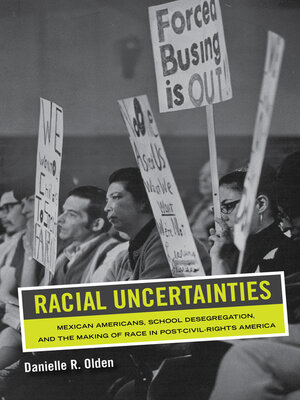Racial Uncertainties
ebook ∣ Mexican Americans, School Desegregation, and the Making of Race in Post–Civil Rights America · American Crossroads
By Danielle R. Olden

Sign up to save your library
With an OverDrive account, you can save your favorite libraries for at-a-glance information about availability. Find out more about OverDrive accounts.
Find this title in Libby, the library reading app by OverDrive.



Search for a digital library with this title
Title found at these libraries:
| Library Name | Distance |
|---|---|
| Loading... |
Mexican American racial uncertainty has long been a defining feature of US racial understanding. Were Mexican Americans white or nonwhite? In the post–civil rights period, this racial uncertainty took on new meaning as the courts, the federal bureaucracy, local school officials, parents, and community activists sought to turn Mexican American racial identity to their own benefit. This is the first book that examines the pivotal 1973 Keyes v. Denver School District No. 1 Supreme Court ruling, and how debates over Mexican Americans' racial position helped reinforce the emerging tropes of colorblind racial ideology.
In the post–civil rights era, when overt racism was no longer socially acceptable, anti-integration voices utilized the indeterminacy of Mexican American racial identity to frame their opposition to school desegregation. That some Mexican Americans adopted these tropes only reinforced the strength of colorblindness in battles against civil rights in the 1970s.
In the post–civil rights era, when overt racism was no longer socially acceptable, anti-integration voices utilized the indeterminacy of Mexican American racial identity to frame their opposition to school desegregation. That some Mexican Americans adopted these tropes only reinforced the strength of colorblindness in battles against civil rights in the 1970s.







